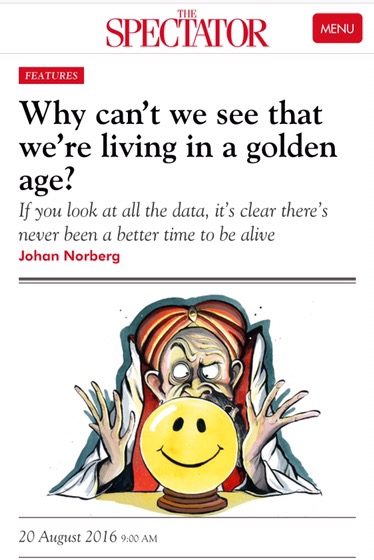Why can’t we see that we’re living in a golden age?
If you look at all the data, it’s clear there’s never been a better time to be alive.
Swedish author, historian, thinker – and my Facebook friend, Johan Norberg has published an article in The Spectator.
Johan Norberg is a historian devoted to promoting economic globalization and classical liberal positions. He is arguably most known as the author of In Defense of Global Capitalism. Since March 15, 2007 he has been a senior fellow at the Cato Institute. In the article – and his new book – he is exploring why we the world different and worse than it is. Here below are some parts of the article.
‘We have fallen upon evil times, politics is corrupt and the social fabric is fraying.’ Who said that? Donald Trump or Bernie Sanders? Nigel Farage or Marine Le Pen? It’s difficult to keep track. They sound so alike, the populists of the left and the right. Everything is awful, so bring on the scapegoats and the knights on white horses.
Pessimism resonates. A YouGov poll found that just 5 per cent of Britons think that the world, all things considered, is getting better. You would think that the chronically cheerful Americans might be more optimistic — well, yes, 6 per cent of them think that the world is improving. More Americans believe in astrology and reincarnation than in progress.
If you think that there has never been a better time to be alive — that humanity has never been safer, healthier, more prosperous or less unequal — then you’re in the minority. But that is what the evidence incontrovertibly shows. Poverty, malnutrition, illiteracy, child labour and infant mortality are falling faster than at any other time in human history. The risk of being caught up in a war, subjected to a dictatorship or of dying in a natural disaster is smaller than ever. The golden age is now.
 Johan Norberg, author and historian
Johan Norberg, author and historian
We’re hardwired not to believe this. We’ve evolved to be suspicious and fretful: fear and worry are tools for survival. The hunters and gatherers who survived sudden storms and predators were the ones who had a tendency to scan the horizon for new threats, rather than sit back and enjoy the view. They passed their stress genes on to us. That is why we find stories about things going wrong far more interesting than stories about things going right. It’s why bad news sells, and newspapers are full of it.
-//-
The only problem? It is simply not true, all facts tells another story Norberg concludes in a new book Progress: Ten Reasons to Look Forward to the Future.
-//-
In 1981 almost nine in ten Chinese lived in extreme poverty; now just one in ten do. Then, just half of the world’s population had access to safe water. Now, 91 per cent do. On average, that means that 285,000 more people have gained access to safe water every day for the past 25 years.
Global trade has led to an expansion of wealth on a magnitude which is hard to comprehend. During the 25 years since the end of the Cold War, global economic wealth — or GDP per capita — has increased almost as much as it did during the preceding 25,000 years. It’s no coincidence that such growth has occurred alongside a massive expansion of rule by the people for the people. A quarter of a century ago, barely half the world’s countries were democracies. Now, almost two thirds are. To say that freedom is still on the march is an understatement.
 Norbergs new book, available shortly
Norbergs new book, available shortly
Part of our problem is one of success. As we get richer, our tolerance for global poverty diminishes. So we get angrier about injustices. Charities quite rightly wish to raise funds, so they draw our attention to the plight of the world’s poorest. But since the Cold War ended, extreme poverty has decreased from 37 per cent to 9.6 per cent — in single digits for the first time in history.
So who did say those words at the start of this article, about how we have ‘fallen upon evil times’? It wasn’t Trump. It wasn’t Farage. A century ago, an American professor found them inscribed on a stone in a museum in Constantinople. He dated them from ancient Chaldea, 3,800 BC.
If you want to read the entire excellent article, click here: The Spectator Article
I also recommend you to read all Norbergs books. He writes very well about interesting topics in a provocative and still entertaining way – these are in my mind important books. Even though I don’t subscribe to all the views of Johan, but many, there is however no doubt thst he writes things that needs to be said.
Johan Norberg’s Progress: Ten Reasons to Look Forward to the Future is published next week. He also appears on this week’s Spectator podcast: spectator.co.uk/podcast

You must be logged in to post a comment.